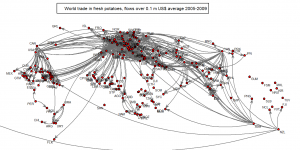Michael Pollan’s “In Defense of Food” did a great deal for me in explaining my misconceptions on diet and Nutritionism, but I felt it stopped short of coming up with any solutions that can have any widespread change. The article by Julie Guthman echoes these sentiments somewhat. Yes, it is important to strive the best we can to eat foods like the ones this book has suggested, both for the environment and for our health. However, this diet is not an option for the vast majority of the world, and many people today still struggle to put any food on the table, let alone the more expensive foods that are not processed and from local markets.
It is for people like this that the global system has been a benefit. In addition to being the greatest redistribution of wealth, the global capitalist system has in great part served to eliminate hunger and malnourishment in many areas of the globe. In an ideal world, poor families in areas with little agricultural development must still have access to a variety of cheap foods, and to do this we must have global competition. But, we must find a way to address the negative aspects of the economic system that allows for this, such as growing inequality and monopolies, and more specifically to food, transportation and packaging wastes.
It is too difficult for me to imagine an abandonment of the global capitalist system. However, if our planet is to remain habitable for future generations, we must do what we can to limit and reverse the damage. The global food trade must be made to be more efficient. There is no reason countries should be shipping food around the entire globe when there is another agricultural exporter two countries over. International governing bodies must do what it can to limit the damage this trade does.

(Source: https://perspectivesandforesight.wordpress.com/2012/11/08/really-a-nontraded-commodity-a-look-at-the-international-potato-trade-network/ )

Hi Jack,
I certainly agree with a lot of what you are saying, but I think it’s important to map out the various reasons why countries aren’t receiving agricultural imports from a country that is much closer than whoever they are receiving it from. The primary reason (at least I think) would have to do with international relations. There is no guarantee that the importing country has a good relationship with the exporter country nearby, this can be due to a variety of reasons (which I won’t go into because it would take a long time and there are too many different scenarios/contexts). But essentially, an importing country probably would not want to bring economic gain to an exporting country that is nearby if they have a bad relationship. Furthermore, in some cases an importing country might open up their markets to exporters that are further away as a means of forming a relationship with that country. Some other reasons might include that a nearby exporter country may not be able to meet the demand from the importing country consistently (as trade deals tend to last for a decent period of time). Or the nearby exporter doesn’t have the breadth of products to meet the needs of the food culture in the importing country.
– Sungkun